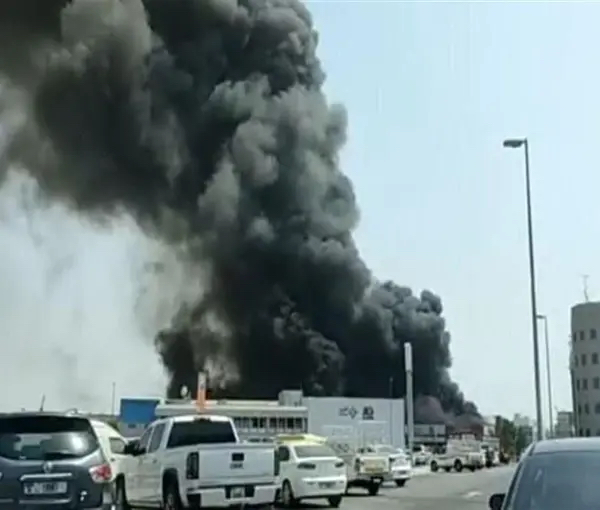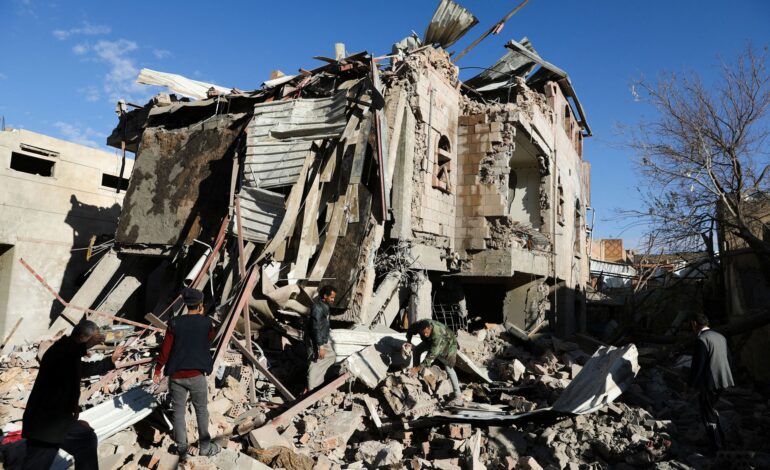Saudi-led coalition hysterical attacks have killed at least 20 people in Yemen’s capital Sanaa, as violence has escalated and exacerbated the humanitarian crisis in the country.
Air strikes in the city, the deadliest since 2019, targeted Yemen’s Houthi group, killed civilians and struck the home of a high-ranking Houthi military official.
Those air strikes followed Monday’s drone and missile attack on coalition partner the United Arab Emirates (UAE) that was claimed by Houthis and killed three people.
U.N. Secretary-General Antonio Guterres “expresses his concern and deplores” the coalition air strikes, his spokesman, Stephane Dujarric, said on Tuesday. Dujarric said on Monday that Guterres condemned the drone and missile attack on the UAE.
“The secretary-general again calls upon all parties to exercise maximum restraint and prevent further escalation and intensification of the conflict,” Dujarric said on Tuesday.
Saudi state media said that early on Tuesday, the coalition had begun air strikes against the Houthi group strongholds and camps.
Houthi media named the Houthi military official whose home was struck as Abdullah Qassim al-Junaid, the former head of the Houthis’ aviation college. The strike killed al-Junaid, his wife, his 25-year-old son, other family members and other unidentified people.
On Monday, two sites in Abu Dhabi including the airport and Dubai Airport came under attack with drones and missiles on a UAE fuel facility, hitting fuel trucks and igniting a blaze near Abu Dhabi airport. Houthis claimed the attack. Two Indian nationals and one Pakistani were killed in the attack and others were wounded.

Smoke rises in Abu Dhabi after a drone attack on Monday, Jan. 17. Photo via Iran International English
In response, the UAE said it reserved the right to respond to “terrorist attacks and criminal escalation.”
On Tuesday, Saudi-led coalition strikes around Sanaa killed a total of about 20 people overnight, the deputy foreign minister for the Houthi administration said on Twitter. More airstrikes followed on Wednesday.
The United Nations has urged de-escalation in the nearly 7-year-old conflict in which more than 100,000 people have been killed and 4 million displaced in a war marked by Saudi-led coalition air strikes as well as Iran-backed Houthi shelling and missiles.
The World Food Program estimates more than 20 million people in Yemen are in need of humanitarian assistance and some 16 million people are food insecure.
As violence escalates, the International Rescue Committee called in a statement on Thursday for the reinstatement of a war crimes investigations body, which was shut down last October. It cited data from the Yemen Data Project showing that in the two months after the panel was closed, coalition bombing rates had increased by 43 percent.
In Sanaa’s Hael district, government employee Saleem Rajeh told Reuters he worries about leaving his family to go to work, while silverware store owner Ibrahim Alwan feels trapped, bracing for further strikes.
“You think about leaving, but where do you go? You can’t make a living in the countryside,” Alwan said. “So do you stay here and wait for the air strikes or do you leave? We are in an unenviable position.”
On Wednesday, in a reversal of previous policy stance, President Biden announced that the U.S. State Department was considering redesignating the Houthi group in Yemen as a terror group.
Biden had made removing the Trump-era designation one of his first major foreign-policy moves last January.
But Biden added that “it’s going to be very difficult” to end the conflict pitting the Houthis against Yemen’s internationally recognized government and the Saudi-led military coalition to which the UAE belongs.
— Wire and staff






Leave a Reply